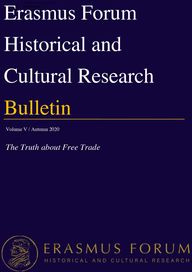
Return to flip book view
Tending Towards a Culture by Peter Stead Erasmus Forum Bulletin / Volume III 2019 !!!!!!08 Fall Erasmus Forum Historical and Cultural Research Bulletin Volume V / Autumn 2020 The Truth about Free Trade
Erasmus Forum Bulletin / Volume V 2020 2 Imperial Federation Map, Walter Crane, 24 July 1886
Erasmus Forum Bulletin / Volume V 2020 3 Erasmus Forum | Bulletin V | Autumn 2020 The contributors to this issue of the Erasmus Forum Bulletin, under the editorship of Professor Nicholas Crafts, consider an issue of fundamental importance in the history of political economy: the persistence of ‘protectionism’. The emergence by the 1830s of a substantial body of opinion in favour of ‘free trade’, more especially so in the United Kingdom of Great Britain and Ireland as well as in other countries where the manufacturing sector was flexing its organisational muscle, marked a decisive moment in economic, political and social history. Measures designed to protect certain sectors of the domestic economy, chiefly the agricultural interest , were subject to a sustained and hostile critique. ‘Protectionism’ has never recovered, intellectually speaking, from the banner waving impact of the mid-nineteenth century free trade lobbyists. It was, and is, associated with the defence of economic activity that would wither on the vine were it not for governmental intervention such as high tariffs imposed on otherwise competitively priced imports. A litany of protectionist delinquence merges moral fervour and political passion with the nicely calculated lore of less and more: high prices, artificially sustained, show the power of the cabal- interest groups with a grip on the levers of governmental power; economic activity, believing itself to be ‘protected’ from competition, ceases to invest in its own enterprises and the consequent lack of innovation will lead sooner or later to a collapse in demand ; the idea of a ‘guaranteed market’ is delusional since the tides of taste, together with the evolution of goods and services, are inherently unpredictable. Sleazy deals and backhanders, corruption- fiscal and intellectual, an oligarchic subversion of the public interest: these are the disfiguring hallmarks of protectionist policy. This list of charges should surely have secured a guilty sentence, followed by a swift burial, for the arraigned defendant. And yet-when it comes to economic history periods of free trade- so clearly the winner over its depraved adversary- are very much the exception and not the rule. Why? Issues discussed include: I. Protectionist impulses, and populist reflexes, in U.S. history from the candidature of William Jennings Bryan for the Presidency (1873) and the Louisiana Governorship of Huey Long (1928-32) to the Presidency of Donald Trump. II. The mercantilist legacy. European statecraft in the early modern era was governed by mercantilist doctrines. National wealth was equated with the possession of bullion (gold and silver) and sovereign princes, their courtiers and representative assemblies alike, equated the ‘national interest’ with the maintenance of a favourable balance of trade, pursued through the imposition of tariffs and the granting of monopolies. The arguments of David Ricardo (1772-1823) in favour of free trade delivered, it is supposed, the coup de grace to mercantilism. Successive crises in the post-1945 British economy’s ‘balance of payments’, together with a short-lived ‘I’m Backing Britain’ campaign (1968), showed mercantilism’s continuing appeal to the public mind and its legislators. III. When does a ‘free trade area’ become a protectionist zone? A survey of economic policy pursued by the Europe’s continental powers from the formation of the ‘Coal and Steel Community’ (1950) to the European Union structures authorised by signatories to the Maastricht Treaty (1992) reveals a commitment to some typically ‘free trade’ goals. These include restrictions on governmental subsidies to individual companies and businesses as well as a promotion of a tariff -free exchange of goods and services across national borders. These internal measures have nonetheless proved to be compatible with the maintenance of
Erasmus Forum Bulletin / Volume V 2020 4 tariffs and dues imposed on goods imported from outside the Union’s boundaries. IV. ‘Mr Baldwin Rows Back’. In 1923 Stanley Baldwin, as Chancellor of the Exchequer, delivered a budget whose aims were avowedly protectionist. This was the curtain raiser to the European inter-war era of ‘competitive’ devaluations and the protectionist defence by sovereign states of their national economies. Baldwin’s budget, while marking a decisive change of emphasis, was also the culmination of a very long national debate. ‘ Free Trade Britain’ has seemed to carry all before it during a heyday that lasted barely a quarter of a century-from the abolition of the Corn Laws (1846) to the 1870’s when the importation of North American wheat led to a collapse of the British agrarian economy. A decade later protectionism, tariffs and import dues had returned to the centre stage of national debate in Britain as well as in those European economies that had followed its lead in the preceding three decades. The tariff schemes introduced by Otto von Bismarck as German chancellor were threatening Britain’s supremacy as a world economy. Having been so successful in the Second Reich surely these same measures ought to guide Britain in its fin-de-siecle age of economic uncertainty? Competing answers served to divide both the Liberal and Conservative parties into warring camps but the debate also breathed new life into the relationship between Britain, its dominions and colonies. In the 1890s the campaign for an ‘Imperial Federation’- a common parliament at Westminster with ‘Home rule’ prevailing across the empire (as well as within Britain’s nations) shone with an allure that inspired many. ‘Imperial Preference’, the realisation in trade policy of that imperial goal, survived the waning of the federalist impulse.